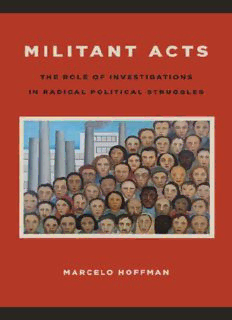
Militant Acts: The Role of Investigations in Radical Political Struggles PDF
Preview Militant Acts: The Role of Investigations in Radical Political Struggles
Militant Acts SUNY series in New Political Science ————— Bradley J. Macdonald, editor Militant Acts The Role of Investigations in Radical Political Struggles MARCELO HOFFMAN Cover image: Tarsila do Amaral, Workers (1933). Reprinted with permission. Published by State University of New York Press, Albany © 2019 State University of New York All rights reserved Printed in the United States of America No part of this book may be used or reproduced in any manner whatsoever without written permission. No part of this book may be stored in a retrieval system or transmitted in any form or by any means including electronic, electrostatic, magnetic tape, mechanical, photocopying, recording, or otherwise without the prior permission in writing of the publisher. For information, contact State University of New York Press, Albany, NY www.sunypress.edu Library of Congress Cataloging-in-Publication Data Names: Hoffman, Marcelo, author. Title: Militant acts : the role of investigations in radical political struggles / Marcelo Hoffman. Description: Albany : State University of New York Press, [2019] | Series: SUNY series in new political science | Includes bibliographical references and index. Identifiers: LCCN 2018007502 | ISBN 9781438472614 (hardcover : alk. paper) | ISBN 9781438472638 (ebook) Subjects: LCSH: Radicalism—History. | Social sciences—Research—Political aspects | Communism—Public opinion. Classification: LCC HN49.R33 H64 2019 | DDC 303.48/4—dc23 LC record available at https://lccn.loc.gov/2018007502 10 9 8 7 6 5 4 3 2 1 To Caetano • Contents Acknowledgments ix 1 Introduction 1 2 Sources of the Militant Investigation in Marxism: Marx, Lenin, and Mao 25 3 Workers’ Inquiries from Breakaway Trotskyism to Italian Workerism 53 4 Badiou, the Maoist Investigation, and the Party Form 81 5 In the Shadow of Oedipus: Enquêtes in Foucault’s Theory and Practice 103 6 Conclusion 133 Notes 143 Bibliography 173 Index 183 Acknowledgments Like any other scholarly undertaking, this book sprang to life from the generosity of others. Perry Zurn and Andrew Dilts provided me with the initial momentum for the book by allowing me to begin to collate my thoughts about the topic of militant investigations in their coedited book, Michel Foucault, the Prisons Information Group, and the Future of Abolition (Palgrave Macmillan, 2016). Chad Lavin went out of his way to facilitate a crucial contact for the initiation of the project. Thanasis Lagios provided me with useful materials and supportive words. Stuart Elden went well beyond normal standards of generosity in academe. He discovered and passed on information about an archival source from the Bibliothèque nationale de France in Paris while conducting his own research there. I am grateful to Timophy S. Murphy for reading a draft of one of my chapters and offering helpful feedback on it. Rebecca E. Karl drew my attention to one of Mao Zedong’s little-known investigations. I owe a very special debt of gratitude to the professors who kindly invited me to share portions of my research for this book at their insti- tutions. I thank Dan Smith for inviting me to speak at “The Political Philosophy of Michel Foucault and Gilles Deleuze” conference at Purdue University in November 2015. I thank Thomas Nail for inviting me to present my research to the Philosophy Department of the University of Denver in February 2016. I am deeply indebted to Margareth Rago and Sílvio Gallo for inviting me to present my research in Portuguese at the 10th International Michel Foucault Colloquium, “ ‘Is It Useless to Revolt?’ Foucault and Insurrections,” at the State University of Campinas in Brazil in October 2016. I also thank the São Paulo Research Foun- dation for funding my participation in this wonderful colloquium. The event was quite simply the highlight of my academic life. It has inspired the direction of my future work. ix
Description: